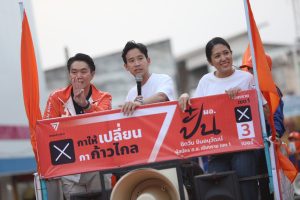Thailand’s main progressive opposition party has announced that it will not join a coalition government with conservative forces after this month’s general election, which is likely to produce a fractured parliament. Speaking during a party rally in Samut Sakhon on Monday, Piyabutr Saengkanokkul of the Move Forward Party (MFP) said that the party would avoid joining a government that resulted from “inter-bloc breeding,” the Bangkok Post reported.
Since the start of the year, rumors have swirled that the opposition Pheu Thai Party (PTP), which currently enjoys a significant lead in the polls, might consider forming a governing coalition with the ruling military-backed Palang Pracharath Party (PPRP).
If such a coalition were to emerge from what is likely to be an inconclusive election on May 14, Piyabutr, an academic who is helping coordinate MFP’s campaign and also serves as secretary general of the Progressive Movement, a reformist political group, said the MFP would rather remain in opposition.
The MFP is the most progressive major party taking part in the May 14 election. Its predecessor party, Future Forward, came in third in the last election in 2019, driven by a surge of support from Thailand’s youth. The party’s banning on a technicality in early 2020 was one of the main catalysts for the wave of youth-led protests that took place in late 2020 and early 2021, before being halted by a combination of COVID-19 and government crackdowns.
The MFP is positioning itself as the electoral home of this protest movement, adopting one of its most controversial political demands: the abolition of Article 112 of the Thai criminal code, which outlaws criticisms of the country’s monarchy. Since late 2021, more than 200 protest leaders and participants have been charged under this lese-majeste law.
In the run-up to the May 14 election, the MFP remains the overwhelming favorite of Thais under 30. According to the latest Suan Dusit Poll, released on April 29, 50.2 percent of respondents in the 18-30 age group said that the MFP was their preferred party, far ahead of the PTP (27.43 percent) and the rest of the political field, which all polled in the single digits with this age cohort. Across all age groups, the party still gained the support of 19.32 percent of respondents, putting it in second place behind Pheu Thai (41.37 percent). Other recent polls have showed MFP leader Pita Limjaroenrat as among tshownlic’s most preferred prime ministerial candidates, alongside Paetongtarn Shinawatra of the PTP.
Paetongtarn, 36, has ruled out forming a coalition with those that led the military coups against her aunt, Prime Minister Yingluck Shinawatra, in 2014, and her father Thaksin Shinawatra in 2006.
“If you ask me if we want to join hands with those involved in the two previous coups, the answer is clear in itself,” she said on April 18, inferring a negative reply. “Look at my face. This is the face that doesn’t like coups.”
That would seem to rule out – or at least render politically difficult – any post-election alliance with Prime Minister Prayut Chan-o-cha, who led the 2014 coup. But given that Prayut recently left PPRP to join the newly formed United Thai Nation Party, Paetongtarn’s statement still leaves enough wiggle room for a possible “inter-bloc” coalition with the PPRP, should the circumstances require it.
This hints at the core difference between the two opposition parties. While the PTP speaks of democracy, and the empowerment of ordinary Thais and a certain degree of economic redistribution, it has shown that it is not above pragmatic accommodations to smooth its return to power.
The MFP, meanwhile, is offering a more radical critique of Thailand’s vastly unequal political economy. It views the upcoming election as a chance to remove the military’s influence over Thai politics and to undertake fundamental reforms to make the country’s political system more democratic and responsive. As mentioned above, it has even been willing to break the taboo of discussion possible curbs to the power of the monarchy. Some of these policies, particularly the party’s stance on Article 112, could conceivably be politically poisonous for Pheu Thai, which has long been accused by Thai conservatives of seeking to supplant, if not overthrow, the current status quo.
In an interview with Reuters late last month, MFP leader Pita Limjaroenrat said that Thailand’s opposition parties should stick together in order to overcome the veto of the military-appointed Senate, which will join with the lower house of Parliament to choose the next prime minister after the election.
“It’s very clear that the current opposition is the right answer for the challenges being faced by Thailand, not the military-backed party that staged the coup,” he told the news agency.
Even though much separates them ideologically, both PTP and MFP share the goal of taking back power from the military. How far this mutual interest will bind them in the frenzy of horse-trading and maneuvering that is likely to follow election day remains to be seen.

































